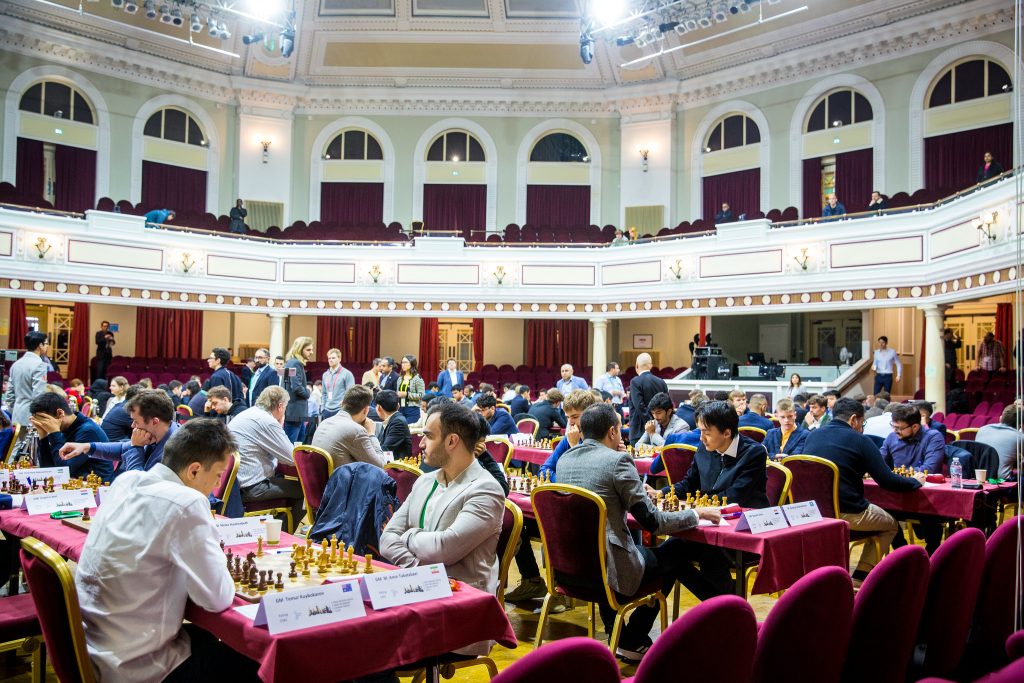Wins don’t come easily, so draws are a normal occurrence at the FIDE Grand Swiss. Only a handful of players are on 100% in both sections. Fabiano Caruana extended his streak against Hans Niemann in classical games. Anish Giri and Alireza Firouzja scored their first wins, and Nakamura drew again. The Muzychuk sisters both won, though in a completely different manner, while top seed Goryachkina is still on 50%.
A lot of players freely share their thoughts on various matters on social media nowadays. Sometimes, these matters concern their opponents, and the things said, while always interesting to the public, can be informative, condescending, disapproving or even critical of the players they meet over the board.
In one of his recent videos, Fabiano Caruana described the scenario of his games against Hans Niemann. According to Caruana, he would obtain a comfortable position out of the opening, increase it almost to a winning one, and then, in mutual time-trouble, Niemann would defend excellently. Caruana would lose almost all of the advantage; they would transpose to an endgame where he would still press for a win, and at the end, Niemann would make the decisive mistake. So far, they have played four classical games, and they were all won by Caruana.
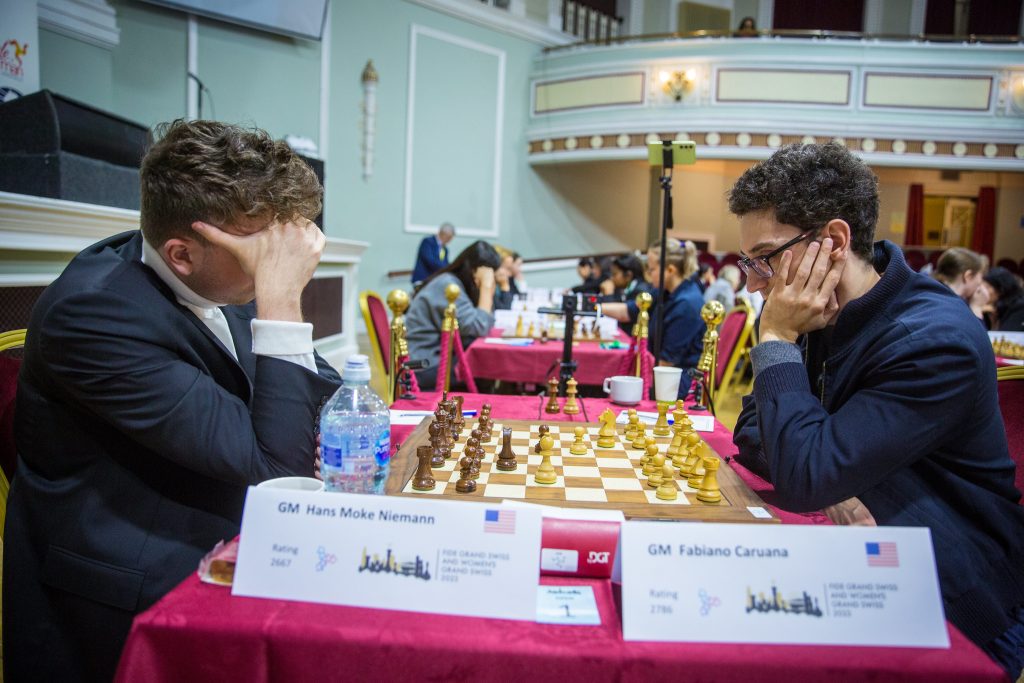
As fate would have it, the second round of the FIDE Grand Swiss saw this very interesting match-up on board one.
Given his 0-4 record, Niemann chose the most solid of all openings, the Berlin in Ruy Lopez. Caruana spent some time deciding what to do against it and went for his preferred 4.d3 followed by 5.Bxc6. Elite players like these positions with plenty of options and an equally huge number of possible move orders and transpositions. Herein lies the popularity of the Giuoco Piano, for example.
As usual in these positions, a manoeuvring game followed. The position underwent different transformations more than once, but Black was doing fine.
Then, an unexpected mistake happened.
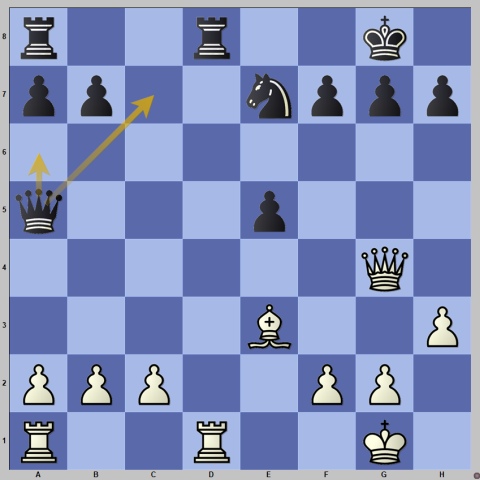
In this seemingly innocuous position, there is more danger for Black than it might appear at first sight. The best was the composed 22…Qc7, keeping the pieces together. After Niemann’s 22…Qa6? Caruana pounced with 23.Rxd8 Rxd8 24.Rd1 when suddenly the wayward position of the queen on a6 meant that Black could not satisfactorily protect the seventh and eighth ranks. Niemann defended the eighth by avoiding the exchange of rooks, but after 25.Rd7 followed Qf3xb7, Caruana completely tied down Niemann’s pieces and won the game.
Caruana-Niemann 5-0.
Alexandr Predke outplayed and eventually checkmated Jan-Krzysztof Duda in a very complex middlegame position that arose from the Vienna Variation in the Queen’s Gambit Declined. White wrapped things up with a powerful attack.
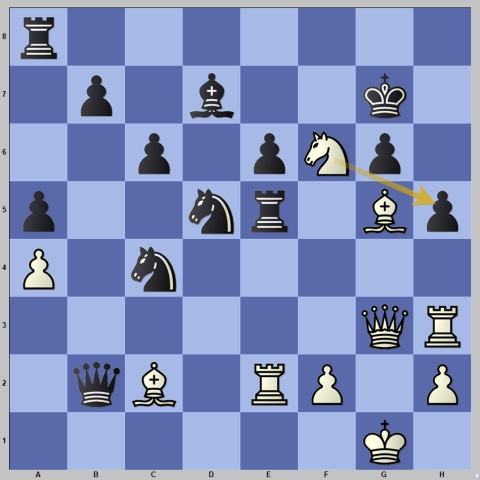
28.Nxh5+! gxh5 29.Bh6+ Kf7 30.Qg7+ and Duda resigned, facing imminnent 31.Qf8# 1-0
One of the players who can qualify via the FIDE Circuit, Anish Giri, scored his first win after Rasmus Svane (White) lost his way in the complications.
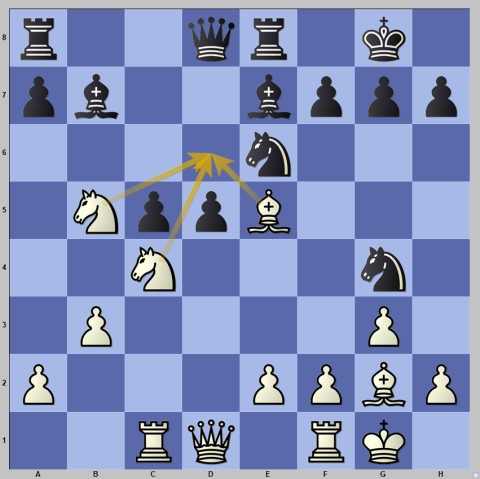
Everything is hanging, so calculation is everything. Svane didn’t manage to navigate the rough waters and played 18.Ncd6? instead of 18.Bd6 or 18.Nbd6. After 18…Bc6 19.Nxe8 Nxe5 White eventually ended up a piece down.

Hikaru Nakamura couldn’t do much with Black against Raunak Sadhwani’s Alapin Sicilian. It’s curious that Nakamura has tested the Alapin himself quite often recently, so the young Indian offered him a chance to play against his own preferred weapon. Nakamura did better than his online opponents by drawing the game.
The leading group scoring 2/2 includes Fabiano Caruana, Alexander Predke, Arjun Erigaisi and the rare non-grandmaster Ramazan Zhalmakhanov. The young IM from Kazakhstan already made a splash by beating Alan Pichot and Bassem Amin in the first two rounds.
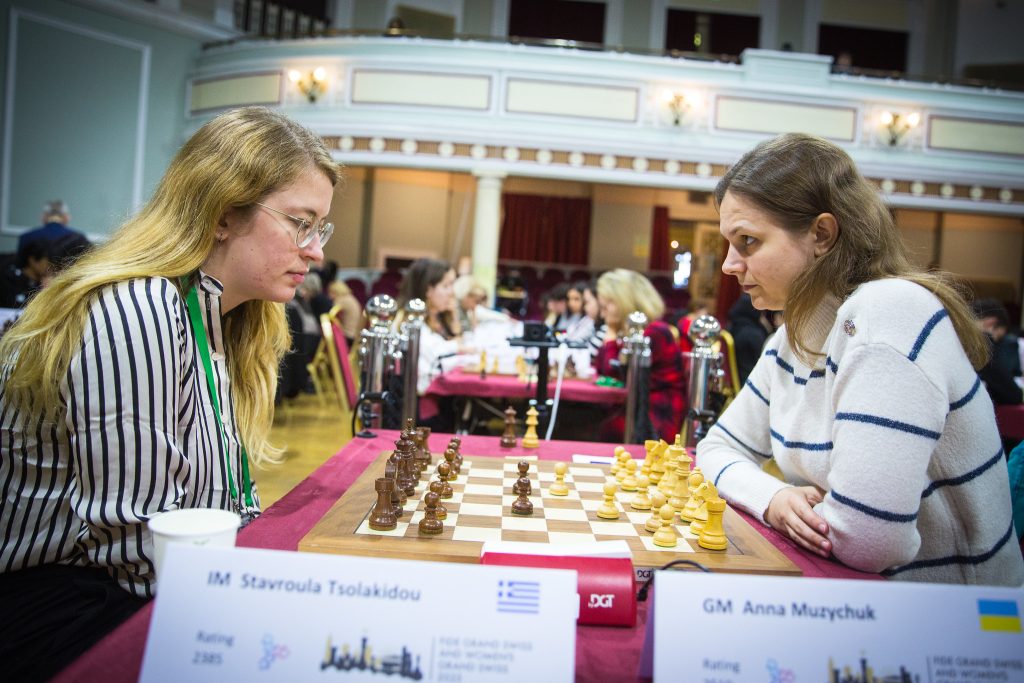
In the women’s section, Anna Muzychuk and Stavroula Tsolakidou played a very sharp line in the Alapin Sicilian, recently tested in online games by both Carlsen and Caruana with the black pieces. The position was inherently more dangerous for Black, so when preparation (or the memorized variations) ended, it was more difficult for Black to come up with good moves. Therefore, it wasn’t surprising that Stavroula faltered first.
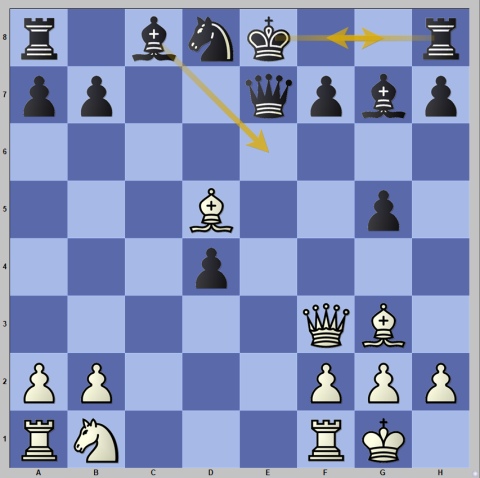
In this critical position, Black had to make the only move 15…Be6, while 15…0-0? (it is natural to move the king out of the centre as soon as possible, but unfortunately for Tsolakidou it didn’t work) failed to 16.Ne4 g4 17.Qb3, and with threats like Bd6 and Rae1, White was close to winning already.
Muzychuk didn’t make the most of her advantage and allowed her opponent to come back into the game and obtain counter-chances. The game saw a dramatic finale in mutual time trouble.
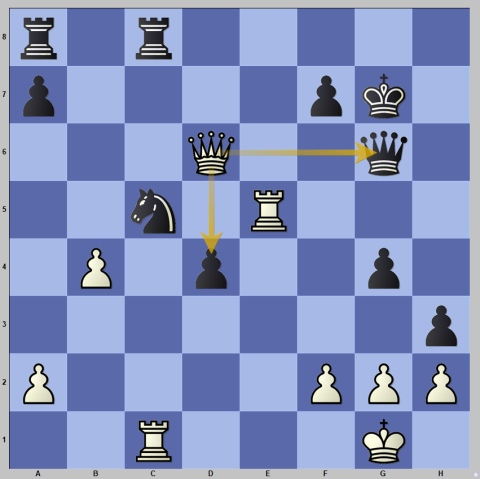
Instead of exchanging queens and then taking the knight on c5, which would have led to a draw, Muzychuk took on d4, 34.Qxd4?? which allowed Black to win on the spot with the tactical shot 34…Nd7! that allows her to cover from the discovered check with …Nf6 while White cannot take on c8 twice in view of the weak back rank after …Qb1.
Tsolakidou missed this chance and went for 34…Nb3? which only led to an equal position. On the last move of the time-control, the following happened.
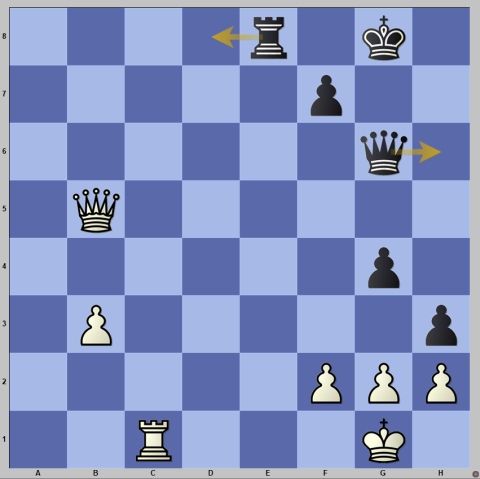
The position is equal as White’s extra pawn is compensated by Black’s counterplay against the opponent’s king. However, with her last seconds on the clock, Tsolakidou played 40…Qh6???, completely forgetting her rook on e8.
A heart-breaking loss for Tsolakidou and a lucky break for Muzychuk.
Compatriots Mihaela Sandu and Irina Bulmaga played an incredibly wild game. In the Ruy Lopez, Black chose the Siesta Variation, played by Capablanca against Reti in 1928.
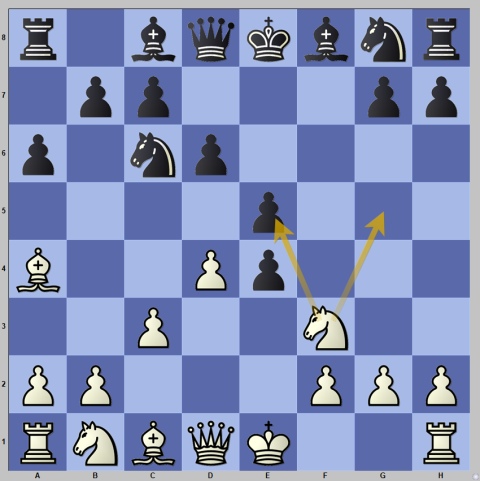
Both Reti and Sandu went for the dubious 7.Ng5?! (instead of 7.Nxe5, which should lead to an unclear position that is objectively balanced). This seems to be a blind spot in modern theory because even Caruana played the same move in an online game against Adhiban! After 7…exd4, Sandu deviated from the games of the luminaries with the inferior 8.0-0, instead of 8.Nxe4.
Objectively, this wasn’t very good, but it led to fireworks after 8…d5 9.c4!? b5?!
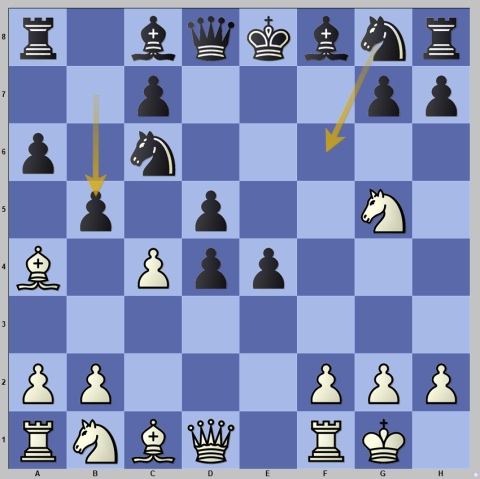
Instead of this flashy move, the developing 9…Nf6 would have given Black an almost decisive advantage. In the game after 10.cxb5 (taking on d5 was better) axb5 11.Bxb5 Bulmaga played the awkward 11…Nge7, voluntarily shutting her kingside when 11…Qd7, with the idea of Ba6 was superior.
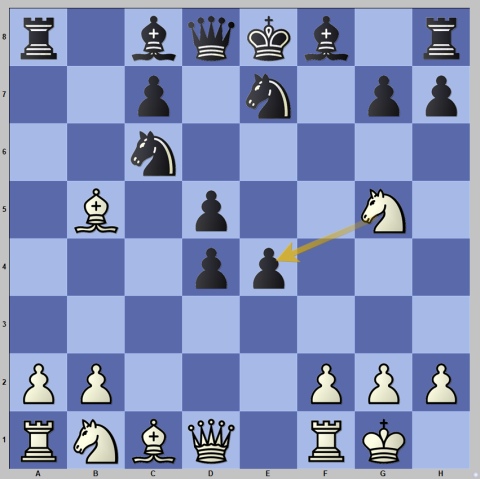
After almost 18 minutes of thought, Sandu put more fuel to the fire with the sacrifice 12.Nxe4!? which after 12…dxe4 13.Qh5 g6 14.Qe5 Bb7 15.Qxh8 Qd5 16.Na3 0-0-0 led to a crazy position where White was an exchange up, but Black had all the centre and development. The engine’s evaluation? 0.00
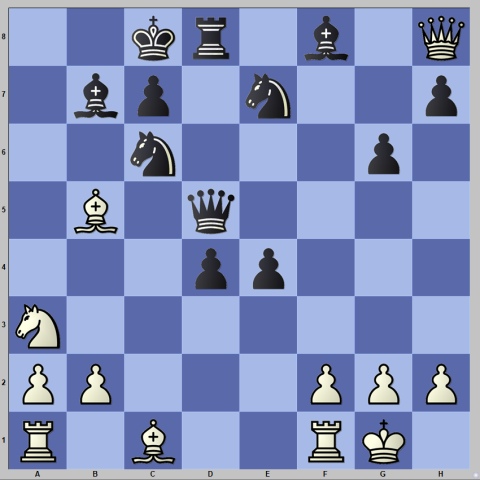
In the mess that ensued, mutual mistakes were inevitable, so first, White was winning, then Black had the upper hand, and in the end, it was Bulmaga who emerged victorious.
Top seed Mariya Muzychuk beat Anna Matnadze relatively easily after Black badly played the opening. The number one seed, Aleksandra Goryachkina, missed several unobvious winning chances and had to settle ofr a draw against Pauline Guichard.
Tan Zhongyi won her second game by beating Indian prodigy Divya Deshmukh. The teenager’s time management proved to be her undoing, as she played more than 20 moves on her last seconds.
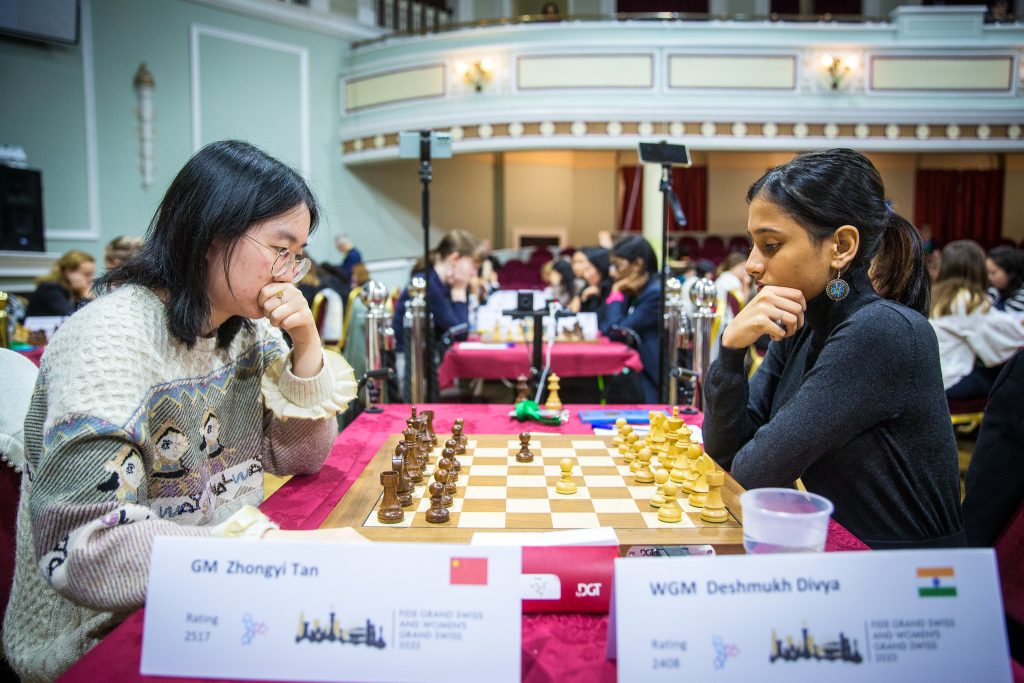
The fact that wins are anything but easy means that high scores are not very likely. On the other hand, catching up after a slow start is equally difficult. Each player will have to evaluate their position and adjust their strategy accordingly.
Fans can follow the Grand Swiss 2023 by watching live broadcasts of the event on FIDE Youtube and Twitch with expert commentary by GM David Howell and IM Jovanka Houska.
Round 3 starts tomorrow at 14:30 PM local time.
Written by GM Alex Colovic
Photos: Anna Shtourman
Official website: grandswiss.fide.com
About the event:
The FIDE Grand Swiss and FIDE Women’s Grand Swiss 2023 takes place from the 23rd of October to the 6th of November at the Villa Marina, Douglas, Isle of Man.
Both tournaments are part of the qualifications for the World Championship cycle, with the top two players in the open event qualifying for the 2024 Candidates Tournament and the top two players in the Women’s Grand Swiss qualifying for the 2024 Women’s Candidates.
Eleven rounds will be played under the Swiss System, with 164 players participating from all continents: 114 in the Grand Swiss and 50 players in the Women’s Grand Swiss.
The total prize fund is $600,000, with $460,000 for the Grand Swiss and $140,000 for the Women’s Grand Swiss.
The first Grand Swiss was held in 2019 in the Isle of Man and was won by GM Wang Hao, who scored 8/11. Because of COVID-19, the 2020 edition of the event was cancelled. The 2021 edition took place in Riga and was won by GM Alireza Firouzja.
This is the second time that a Women’s Grand Swiss event will be held. The inaugural edition in Riga was won by GM Lei Tingjie.


